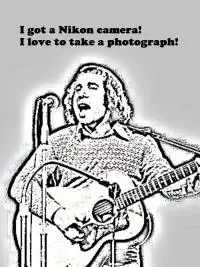Before I launch into the paragraph edits, I wanted to talk a little about what I call “The quick, brown fox jumped over the lazy dog” writing—prose filled with adjectives in lieu of more “showing” vs “telling” description—and its more atrocious cousin, "The quick, brown fox gleefully jumped over the lazy dog" writing.
If every noun or verb in a sentence is preceded by one or more modifiers, cut those that are redundant or those that are failing to tell us anything relevant to the story. For those that remain, see if you can turn them into a “show” instead of a “tell.” (The quick and dirty way to change a “tell” into a “show” is to imagine playing a game of Catch Phrase or Taboo. You have to get the reader to guess the adjective or adverb without explicitly saying it. For example, instead of saying “The man was sad.” You might say, “He hung his head and his shoulders slumped as a tear rolled down his cheek.”)

The dog lies on the ground, head resting on his paws, as a fox sprints from the brush, leaping over him.
On to edit your paragraphs!
First up we have Leif (erikodin), with following excerpt:
A bouquet of hot oil fills the arid crankcase as I perform a typical shipboard job of pulling a large piston from the engine. Stop the engine, crank the engine over to the proper flywheel degree, remove the head after stretching the bolts, unbolt the piston rod from the crosshead and pull it out with the overhead engine room crane. This is all that needs to be done to pull a piston on a fifty eight thousand horsepower slow speed Sulzer.
Leif says: Just looking to interest readers from the beginning, especially those who know nothing of large slow speeds. I feel that there is not enough action right off the bat. This is the beginning of a buildup to a deadly accident so any changes need to stay relevant to the job being performed. There is a death within the first two pages so maybe this is ok to start the story with.
Starting with action is almost always a good idea, and right off the bat you have your protagonist doing something with this engine, and describing it to us, which does the double duty of giving him authority. But one potential problem with this paragraph is a lack of setting and context. Describing the details of what you’re doing before we know what or why or where can be disorienting. Here we start with oil, crankcase, shipboard, piston, engine, in that order. “Shipboard” is the only hint that we’re probably on a boat. But we don’t know anything more than that. We don’t know why we’re on the boat, how big the engine is (we’re given horsepower, but not physical size), why the protagonist is pulling the pistons—is this some sort of maintenance procedure? Is he cleaning or inspecting? Repairing?
 If this is leading up to a deadly accident, understanding where we are in space physically, the size of the equipment, and the potential danger is presumably important. There’s a big difference between “pull a piston” and “pull a five-ton piston” for example. If we see a multi-ton object dangling overhead, we all want our hardhats.
If this is leading up to a deadly accident, understanding where we are in space physically, the size of the equipment, and the potential danger is presumably important. There’s a big difference between “pull a piston” and “pull a five-ton piston” for example. If we see a multi-ton object dangling overhead, we all want our hardhats.
I should emphasize that most of what I write in the revision below is complete and utter bullshit. I’ve made it all up not knowing the first thing about Sulzer engines. The purpose is simply to illustrate the types of details you might want to include, so hopefully something in this will be helpful.
Revision:
Early morning I’m in the engine room on board the ship, servicing the fifty-eight-thousand horsepower slow speed Sulzer. Once a week it’s my job to pull the pistons and check for wear and tear. The engine itself is the size of a small house, and it whines and squeals like a braking train as it comes to a stop when I cut the power. After manually cranking the flywheel to the proper degree, I remove the head, and unbolt the piston rod. The room fills with the stench of hot oil as I extract the five-ton piston with the overhead engine room crane.
Before, all we really knew was that we were pulling a piston on an engine that might be on a ship. Now we’re solidly grounded in the engine room on a ship and we know not only how big things are, but the reason for messing with the engine in the first place. You could potentially add more details as you see fit if they are relevant to what happens later. Who else is in the room? What are the potential dangers? etc. But the real key here is grounding the story and giving just enough context so that the reader feels like they can see where all of this is taking place instead of staring up close at engine parts.
Mr. Humpfree VanDurden has the following contribution:
The renegade pimple that sprung up on my forehead this afternoon only served to confirm it, tonight was the night, the deadline was up and bells were ringing. Twenty-eight months of begging, pleading, and bargaining with the Biblical Boy Wonder and not a single sign. No tingling, no toe-wiggling, not even a hint of morning wood. Nothing. Not one goddamned sign. What made Lazarus so special? Or the lady who touched his flimsy robe? Didn't I deserve a little love? A simple sneeze in my general direction would surely fix something. Anything. It didn’t need to be a miracle, just a sign. WWJD? I'll tell you first hand what he'd do - zero, zip, nada, nothing. Selfish bastard.
Humpfree says: As a novice I don't have specific goals in mind with this, just seems fun. Obviously I'm curious to see what y'all think and I can use and will appreciate any input - good or bad. Story is about a guy struggling to adapt to his new life as a wheelchair user (quadriplegic)...Thx
While the voice in this piece is engaging, the biggest issue I had was that I would have never guessed this man was quadriplegic if you hadn't provided the explanation. “Tonight was the night” coupled with pimple made me think he was going to some event. It also wasn’t clear at first that the Biblical Boy Wonder was Jesus, even with the Lazarus reference. This might just be me being dense, but it read as though there was perhaps some modern day character, “The Biblical Boy Wonder,” who was claiming special power, and our protagonist was trying to get his attention, but his adversary, Lazarus, was being given preference. I was thinking this might be a story with supernatural elements. So the main issue is one of clarity.
 Also, I’m not sure allusion to Lazarus fits since Lazarus was brought back from the dead and not cured of paralysis. The same is true of the hemorrhaging woman who touched his robe. I’m no bible expert, but I did a brief Googling and found this story. So perhaps that would work better if this is about someone wanting to walk again.
Also, I’m not sure allusion to Lazarus fits since Lazarus was brought back from the dead and not cured of paralysis. The same is true of the hemorrhaging woman who touched his robe. I’m no bible expert, but I did a brief Googling and found this story. So perhaps that would work better if this is about someone wanting to walk again.
I took the “WWJD? Nothing” bit out in my revision because I don’t think it worked with the changes I made, but I do think it is an effective line and perhaps one you could use throughout the story as a sort of “chorus.” You could apply variations: WWJD? He would shit on my hopes and dreams. WWJD? He’d walk right past me like I was invisible. Etc, etc. Though come to think of it, this might be a little too similar to the chorus of “What would Jesus not do?” that Palahniuk uses in Choke.
Revision:
A renegade pimple sprung up on my forehead this afternoon and I couldn’t even pop it. It just sat there, mocking me in the mirror. Ultimate confirmation that this was how it was going to be from now on. Twenty-eight months of begging, pleading, and bargaining with Jesus and still no tingling, no toe-wiggling, not even a hint of morning wood. Nothing. Not one goddamned sign. Twenty-eight months. That’s what the doctors said. If there was no change by then, then I’d better get used to being in this chair forever. Unable to walk, unable to pick my own nose. I mean, what made the crippled man on the shore of Bethsaida so special? Jesus came by, told him to walk and he just…did. He cured lepers, turned water into wine, raised the dead—the Biblical Boy Wonder performed all sorts of miracles. Couldn’t I just get a sneeze in my general direction? Anything. It didn’t even need to be a miracle, just a sign. Some indication that he gave a shit.
Lastly we have Carrie Cunningham with the following girl meets guy scene:
I breathed in the tempting smells of Savannah Sweets. Melted chocolate, vanilla, and nuts had beckoned me inside from the Celtic festival. Still holding my prized Nikon F-401 X camera, I scanned the store through its viewfinder wondering what would appeal to me today. Fudge? Key lime pretzels? My eyes lingered near the rack of pralines. Perfection. My mouth started to water right away. A guy in a dark gray Member's Only jacket and a chambray shirt had my focus. I adjusted the camera to get a closer look. There was something very appealing about him. I tilted the camera lower. His dark Calvin Klein jeans were tight enough to make me want to get a bit closer. His attention was on a display of pralines. I was free to observe him unseen. His gun-metal sneakers were from one of the latest campaigns from Nike for the Pegasus GX. Guys on campus had been talking about this shoe. I scanned back up the length of him. Apparently, he was weighing which would be tastier. I let my camera rest on the strap about my neck. My eyes never left his face as I moved nonchalantly through the crowded shop making a beeline for him. Deep brown bordering on black wavy hair curled enticingly about his very pale neck. It beckoned me closer. He was what I was in the mood for tonight. “Delicious.”
Carrie says: My goal is to have this paragraph come to life. I want the reader to see this guy through her eyes. My protagonist is meeting one of two possible romantic leads.
This is a fun paragraph to dig into. You have a lot of things going on and all five senses are engaged, but there are also several different things we can look at in terms of revision:
Phrases like “the nuts beckoned me”, and “my eyes lingered” are sort of borderline. Phrasing things in this way can be a good way to avoid “to be” verbs or the infamous “I”, but you also want to make sure you aren’t trading in for something awkward or overwrought. When I read this paragraph, the voice inside my head sounded very formal and dramatic, but I’m not sure that was the intent. You have a first person narrator. Is your character the sort of person who would use the words “beckoned” and “lingered” in every day speech? If not, then some editing might be in order.
 The following lines are all “tells” as opposed to “shows.” In fact, each of these passages are redundant and unnecessary because you actually do show all of these things in the prose itself. The quick and easy solution here is the delete button.
The following lines are all “tells” as opposed to “shows.” In fact, each of these passages are redundant and unnecessary because you actually do show all of these things in the prose itself. The quick and easy solution here is the delete button.
“...wondering what would appeal to me today.” (We see her wondering in the next line.)
“There was something very appealing about him.” (We see this in how she describes him and the fact that she approaches him.)
“I was free to observe him unseen.” (We already see his attention is on the pralines and that she is indeed observing him unseen.)
“He was what I was in the mood for tonight.” (We get this from the fact that she approaches him.)
Now, as for this guy being a potential love interest—note that we get nothing of his personality, very little of attractive physical traits, and almost exclusively his clothing brands. Many readers might struggle to align with a character who views these things as what makes a person appealing. When we get brand names of all of his clothing items emphasized, he and/or our narrator can start to sound a little vain and lacking in dimension. You don’t even necessarily need to give too much detail at all. The fact that our protagonist feels compelled to approach him says something, and we’ll get the attraction more as they interact.
In my revision I ended up taking most of the brand names out, but they don't have to go away. I'd only caution that if you keep them, then consider adding more description of the man's other traits to balance them out.
Revision:
The smell of melted chocolate, vanilla, and nuts was enough to pull me and my growling stomach away from the Celtic festival and into the Savannah Sweets shop. Once inside, I scanned the store through the viewfinder of my Nikon camera. I’d gotten used to looking at the world like this. I must have taken over a thousand pictures today alone.
Fudge. Key lime pretzels. Kettle corn. Truffles. Guy in a dark gray jacket and chambray shirt examining the rack of pralines. I adjusted the camera, tilting it lower. Tight, dark jeans accentuating an ample package. And he just stood there like it was nothing to hide. Gun-metal sneakers. I have nail polish that color. I scanned back up the length of him. Deep brown wavy hair framed his face and curled in locks around the base of his neck like little fingers touching that sweet spot just behind his ears. He held salted pralines in one hand and caramelized in the other as if weighing which would be tastier. Caramelized, obviously. I let my camera rest on the strap about my neck. Someone needed to tell him. I moved through the shop, casually browsing the merchandise until I stood beside him. Pointing at the bag in his right hand, I said, “These are to die for.”
That’s it for this round, folks! Feel free to discuss these edits and make other suggestions in the comments.
And if you have a paragraph or short passage in need of editing, post up to 300 words of prose in the comments below, together with a brief description of the editing goal and any relevant contextual information, and you may be chosen to have your paragraph edited next time!

About the author
Gayle Towell’s stories have won the 2013 Women’s National Book Association writing contest, the 2014 Willamette Writers Kay Snow fiction award, and have been published in Menacing Hedge, Pif Magazine, and the Burnt Tongues anthology among other places. Her novella Blood Gravity was released through Blue Skirt Productions in September 2014. Gayle is the founding editor of Microfiction Monday Magazine and cofounder of Blue Skirt Productions, an artists’ collective. For more information, visit gayletowell.com.








